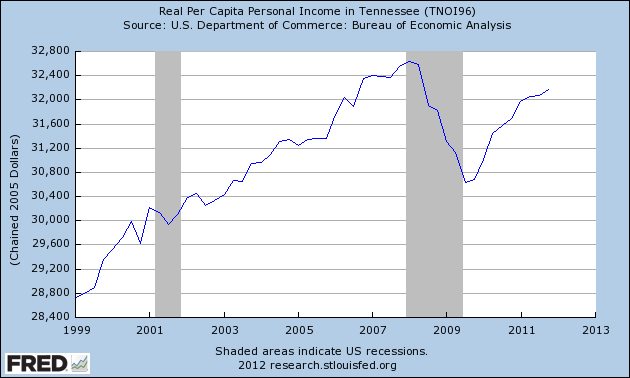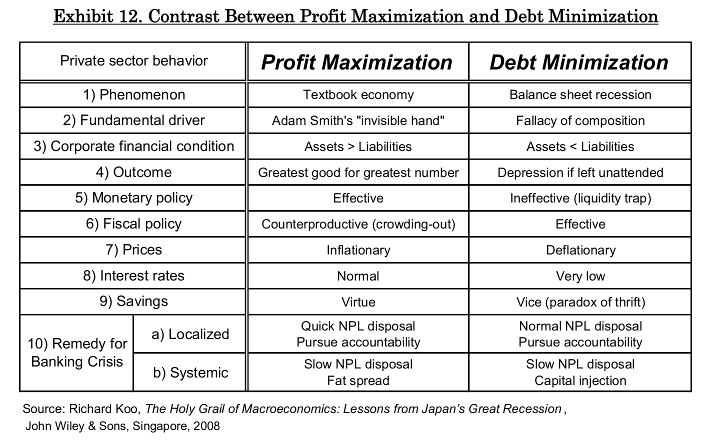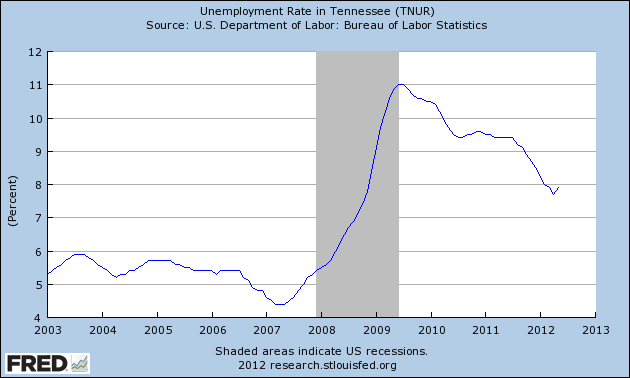Reducing unemployment, growing incomes, and getting things back to normal are at the top on everyone’s wish list nowadays. Both Tennessean’s real income and employment crashed in 2008, and have yet to recover to their former levels.
 In normal times, it typically takes a country 4-5 years to fully recover in the aftermath of financial crises. However, those crises occurred against the background of an otherwise healthy world economy, and were usually cured by wage deflation stimulating increased exports to healthier countries.
In normal times, it typically takes a country 4-5 years to fully recover in the aftermath of financial crises. However, those crises occurred against the background of an otherwise healthy world economy, and were usually cured by wage deflation stimulating increased exports to healthier countries.
The current crisis hearkens back to the Great Depression, in that most of the world’s major economic powers are experiencing a simultaneous slowdown, and thus there is little hope of an export-led recovery (unless Little Green Men show up on our doorsteps wanting to trade). And there are more negative economic signs than positive on the horizon. Given that, full recovery is likely to take a further 5-10 years.
The chart below highlights the essential differences between a normal economy and one experiencing a “balance sheet recession”, which is a polite academic term for a depression.
 In normal times, the desire to consume exceeds the desire to save. Supply-and-demand allows savers to charge consumers (via the interest rate) to borrow their money. For their part, consumers do their best to keep all those dollars circulating through the economy, creating a virtuous cycle that causes the economy to grow.
In normal times, the desire to consume exceeds the desire to save. Supply-and-demand allows savers to charge consumers (via the interest rate) to borrow their money. For their part, consumers do their best to keep all those dollars circulating through the economy, creating a virtuous cycle that causes the economy to grow.
While that is usually true, a depression is the exception that proves the rule. Because people are now underwater due to the housing collapse, they have switched from consuming to saving. Now that savers outnumber consumers, consumers have pricing power when it comes to borrowing, and that has pushed interest rates on savings accounts and CD’s near 0% (and in the case of US bonds, *below 0%* in real terms), hurting savers. For their part, consumers increased savings rate sets off a vicious cycle which causes the economy to shrink.
It has similarly affected business investment. Companies are now avoiding profitable investments that require long horizons to pay off in favor of short-term debt minimization. From their perspective, why invest in a new factory or new machinery when consumers aren’t in any position to increase their spending? Paying off debt is much less profitable, but also much less risky.
That simultaneous drop in both personal consumption and business investment has generated distressing levels of unemployment.
The “natural” rate of unemployment (absent the economic crisis) is roughly 5.5%. Today after three and a half years of recovery, unemployment still stands at 7.9%. Arithmetic says:
6.4 million Tennesseans x (7.9% – 5.5%)
= 154,000 Tennesseans unemployed by the crisis
If it were a city, it would be the 5th largest in the state, ahead of Clarksville (136,231). And that does not include people who are working part-time but want to work full-time, or people who have given up looking altogether. So the 154k Tennesseans is only a lower limit on the size of the unemployment problem.
Even if you still have a job, the tough economic outlook combined with abundance of unemployed has hit incomes hard, especially for blue-collar workers. It’s hard to negotiate for a pay raise when there’s 5 unemployed people who would happily do your job for less.
Economics can be a constant source of irritation to politicians, because while it always gives the answer you need to hear, it rarely gives the answer you want to hear. Unfortunately, when it comes to solving problems of this scale, the intersection of what’s economically desirable and what’s politically possible can be achingly small.
The public always wants political decisions to be pain-free and in their favor. On the other hand, politicians often take a short-term ideological view, and advocate “solutions” that cause further long-term harm because it helps them today and they will be out of office before the butcher’s bill comes due. And the state’s year-to-year balance-budget requirement, while normally a wise constraint on legislative ambitions, in current circumstances prevents the state from taking steps that are in the public’s long-term best interest.
With all that said, what steps do you believe the state can take (via tax structure, expenditures, infrastructure investment, training, economic development, etc.) to stimulate the state economy, help put people back to work and put us on a sustainable path to growth?


With unemployment estimates at 7.9%, something must be done to reduce this rate not only for those in search of a job today but for tomorrow’s college graduate looking to start a career, for the single mother working to feed her children, and for the couple trying desperately to provide for their family.
How can we do this? In my years as owner of Kemp’s Foodland, I learned that small businesses are the life blood of our economy. Reducing regulatory burdens on businesses and creating tax incentives for employment will spur job growth. Across the board tax cuts for local businesses employing Tennesseans will create employment opportunities for our hardworking citizens. Legislation should be drafted that protects these businesses not puts stumbling blocks in their way.
We need to work to make our education system better using the most up to date technology available. Having a better education system will ensure that our students are more prepared for the workforce. This will make our students are more attractive to potential employers.
Better infrastructure needs to be built. We need to make sure that our state has the best roads, the most accessible broadband connection and different means of transportation of product. This create an advantage in the marketplace to help our business compete, thereby creating more jobs.
While the answer to this problem is multi-faceted, we can all work together to keep the American dream alive in Tennessee.
The Economy, of course, is on everybody’s mind, and a Hot subject. From the Federal Level to the State, to the local levels of government. So what are we going to do about the economy? Does anybody have a clear answer?
I am not against growth, but I may be against where they want to put it. I support small business, and I attend church with folks who have just recently started their own business. This seems to be a growing trend.
I have lots of question about this subject myself. I read where another candidate said, “I will cut the “Red Tape” on new business”. What does that really mean? Sounds like a safe political line to me. I don’t want someone decorating the State House, I want someone who is going to work for the people.
I also read that we need to give tax breaks to new business’, and loosen the tax burdens on small business’, so they can grow and hire workers. Sounds great, but I hear this every election, from every candidate, at every level. Now I am not a businessman, nor have I ever owned a business. The Governor, the Tennessee House and Senate, if not all of them, then most are business owners. So my question is, if tax breaks is the answer, then why hasn’t the laws been changed by now? Is this just politics as usual?
Do the jobs have to be in the 78th District? Can they be in a neighboring county/district? There are areas that have been hit hard across the State. I am all for bringing jobs to Tennessee. If a company wants to set up shop in Clarksville, GREAT! This could lead to more companies coming to the State and even to the area.
I hear that 75% of the residents in Cheatham County commute outside of the county to work. Thats a problem, or is that just an excuse to bring in growth/county revenue? When I moved to Pleasant View 11 years ago, I knew I would have to travel 10 plus miles for a chain restaurant. I knew I had a 40 minute drive to work in Nashville every morning, and a 45 minute or more drive back home every night. These things did not bother me, cause this is where I wanted to live. I chose to live here, in the country. For awhile, every year I was hearing someone talking about how their hunting grounds have been taken away for development.
Folks, don’t get me wrong, I am not against growth. I want smart growth, not overgrowth. Is it so bad that someone drives to Clarksville, or Nashville, to make a living? If not managed correctly, the growth will cause higher taxes, to help pay for the growth. Government always seems to want/need more money. Well, how much do you have? Is your pay going up?
I love when a politician brags about how they created, so and so many jobs. Talking to a company in Ohio, in to moving to Tennessee, is not creating jobs. Thats stealing them from another State. If a company moves to Tennessee, who’s to say they will hire Tennessee workers, or anyone currently unemployed? They may move their employees here, if they choose to.
Every small town and large city across this country is looking to boost their economy. I do believe that it is going to take a team effort from the Federal, the State, down to the local level, to help better Tennessee’s economy……..whoever wins the election in November.